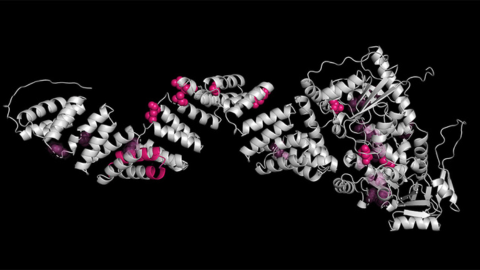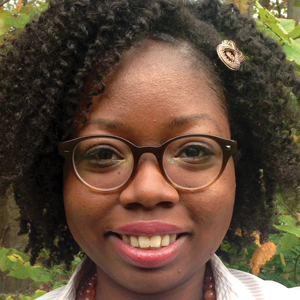‘I was in the right place at the right time’
Mark Witmer, a senior director at Bristol Myers Squibb, talked to ASBMB Today about what it is like to be an industry manager. Witmer is a member of the American Society for Biochemistry and Molecular Biology Membership Committee. This interview has been condensed and edited.

Name: Mark Witmer
Current: Senior director, Bristol Myers Squibb
Education: Ph.D. in organic chemistry from Cornell University and postdoctoral fellowship at Pennsylvania State University
First job outside of academia: Senior principal scientist, Bristol Myers Squibb
Favorite molecule or protein: "My favorite protein is glutamine synthetase, and that's because that's the protein I worked on as a postdoc. It's the first protein that I ever purified, and it was basically like making tofu, a bunch of reputation steps. It was very easy to purify."
How did you get into industry?
I was considering going into teaching at a small liberal arts college. I wasn't sure what I wanted to do, so I started looking for an industry job.
I was in the right place at the right time. My postdoctoral adviser (Joe Villafranca) had spent his entire career at Penn State and decided it was time to make a change. In 1992, he came to Bristol Myers Squibb to become executive director of a department. I was looking for a job, and he offered me a position in his new lab, and I was very fortunate that way.
Once I got here in August of ’92, I just had a lot of great opportunities over the years and ended up staying here for my entire career since then.
Tell me more about your journey.
When I first started, I was asked to work in the lab, and I was hired to do lab research. Then I was asked to manage one scientist, and over time I was given additional management opportunities.
As my career progressed, I spent less time at the bench. But it wasn't until I had been working for over 20 years that I really got to a position where I was managing a larger group.
My current position is entirely management. That involves managing several senior direct reports who themselves are responsible for managing teams. I have three different teams that I'm responsible for.
We're part of the small-molecule drug-discovery organization at BMS. Our teams are responsible for producing recombinant proteins that drive drug discovery, creating cell lines using CRISPR methodology, culturing mammalian cells and also doing biophysical characterization.
My job is really managing the managers, looking for new areas for our research to grow into, and also some work with outsourcing companies.
What has been good about being a manager?
I've had a lot of growth opportunities. I was given the opportunity years ago to really focus more on biophysics and learn to do (surface plasmon resonance). I really loved that, and I think that really helped me develop, both in terms of the biophysics and also as a manager. It was a direction I never really consider previously.
I also had opportunities to work with some of our external collaborators, and we had various alliances or collaborations with external companies.
There were a couple of reasons why I spent my entire career here. One was personal and related to family location, but it was also because the science. There was good science going on here — and having a lot of good colleagues here who I really trusted and had trust in me. If all those things hadn't come together, I probably would have looked for a new job elsewhere. But I was able to get a lot of good opportunities at BMS and kept growing and getting a lot of satisfaction.
What qualities and skills are most important?
I've been a participant in the ASBMB undergraduate speed networking event, as an industry member. One of the things that I've mentioned in all those opportunities is what I think is important to succeed: respect — demonstrating respect for all of your colleagues and treating them as well as you can. Also, passion — having passion and not being afraid to follow your passion. And be willing to learn new things; change is constant in industry. You have to continue to grow and learn one way or another.
Finally, what I think is really important, maybe most of all, is to be a strong and excellent collaborator. It's so essential, especially in industry, because we are all working on one big team to create new drugs and new medicines to help patients. If you can't collaborate, you can't work very well in industry. I often say you can be the smartest scientist in the world, but if you can't work with other people you're not going to last going to last very long. I think that's part of how I got to the position I'm in now: by being very collaborative.
Any final advice?
It's really important to have the right mindset, and you have to be technically excellent, but you also have to be a good people person.
I've been a participant in the ASBMB undergraduate speed networking event, as an industry member. One of the things that I've mentioned in all those opportunities is what I think is important to succeed: respect — demonstrating respect for all of your colleagues and treating them as well as you can. Also, passion — having passion and not being afraid to follow your passion. And be willing to learn new things; change is constant in industry. You have to continue to grow and learn one way or another.
Finally, what I think is really important, maybe most of all, is to be a strong and excellent collaborator. It's so essential, especially in industry, because we are all working on one big team to create new drugs and new medicines to help patients. If you can't collaborate, you can't work very well in industry. I often say you can be the smartest scientist in the world, but if you can't work with other people you're not going to last going to last very long. I think that's part of how I got to the position I'm in now: by being very collaborative.
It's really important to have the right mindset, and you have to be technically excellent, but you also have to be a good people person.
Enjoy reading ASBMB Today?
Become a member to receive the print edition four times a year and the digital edition monthly.
Learn moreFeatured jobs
from the ASBMB career center
Get the latest from ASBMB Today
Enter your email address, and we’ll send you a weekly email with recent articles, interviews and more.
Latest in Careers
Careers highlights or most popular articles

Upcoming opportunities
Friendly reminder: May 12 is the early registration and oral abstract deadline for ASBMB's meeting on O-GlcNAcylation in health and disease.

Sketching, scribbling and scicomm
Graduate student Ari Paiz describes how her love of science and art blend to make her an effective science communicator.

Embrace your neurodivergence and flourish in college
This guide offers practical advice on setting yourself up for success — learn how to leverage campus resources, work with professors and embrace your strengths.

Upcoming opportunities
Apply for the ASBMB Interactive Mentoring Activities for Grantsmanship Enhancement grant writing workshop by April 15.

Quieting the static: Building inclusive STEM classrooms
Christin Monroe, an assistant professor of chemistry at Landmark College, offers practical tips to help educators make their classrooms more accessible to neurodivergent scientists.

Unraveling oncogenesis: What makes cancer tick?
Learn about the ASBMB 2025 symposium on oncogenic hubs: chromatin regulatory and transcriptional complexes in cancer.

